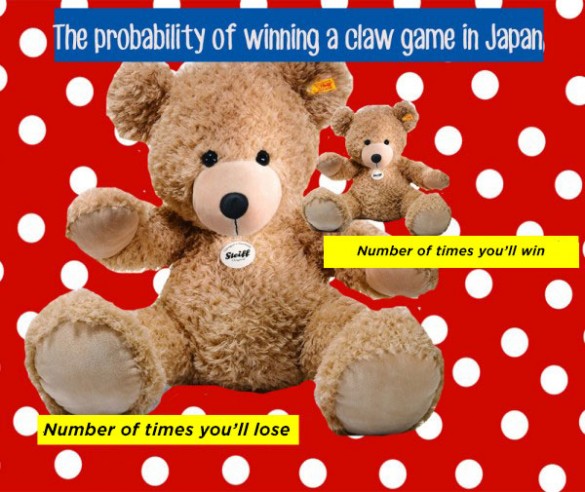As I write this, I'm waiting for our students to return from their weXplore, a five-day excursion that takes students beyond their host city for immersive cultural experiences. For the past two months, we as a school have called Maun, Botswana, our home. It's a small town on the edge of the Okavango Delta and, for many travelers, a doorway into Africa. But Maun is only one perspective, and it...
Read More
While enrolled at THINK Global School, students are encouraged to be creative during the course of their studies and travels. When the students document these thoughts, we are often delighted with the results. In the following exercise for Guillermo Machado’s mathematics class, ninth graders Danielle and Galek document their work in trying to determine how much money a Japanese claw machine requires before resulting in a win.
Today, apart from traditions, Japan is best known for five things: cars, anime, computer parts, nuclear reactors, and video arcades. The first time I walked into one such arcade I was shocked. In addition to all the usual thrills such as Mario Kart, Dance Dance Revolution and sharp shooter-like games, there was also an extremely large amount of claw machines. While these are obviously not unheard of to Westerners like myself, rarely are they seen in such copious amounts and in such serious gamer territory. Running though my mind at the time was a thought shared by many first-time visitors to such places: “I wonder how much money the arcade is making on these things?” in addition to the popular “What are the odds that you would actually win a prize?” And so, when the time was ripe for Galek and I to choose a math project, we remembered these shared thoughts and ponderings and resolved to turn it into our mathematical investigation.
First things first: in order to calculate the sum, we would need to find out, on average, the probability of winning a prize from the machines. The only way to do this was to play them. In order to keep a balanced experiment, we alternated machines and more than one person would have to play each round. That would be the first step in our investigation. From there we also arranged to poll some of the other players in order to ask them how much money they spent, how often they won and how many times they went to the arcade per week on average.
- One survey with our research questions translated into Japanese
- A total sum of 1,000 JPY each in coins to play the machines
Research Questions
How often do you come here?
- This is my first time
- 1-2
- 3-4
- 5+
- Every day
How much money do you spend here each time?
- 100 JPY
- 500 JPY
- 1,000 JPY
- 2,000 JPY
- Everything I have (3000+)
Have you won anything today?
- Yes
- No
- I always win
The survey itself would cause complications, one of which being the language barrier. Working together with Theresa, a student from Hiroshima International School, we were able to translate all three of our questions and put them into an instant, looped survey on the iPad using the application, “Quick Tap Survey.”
On the day of the investigation, we arrived at Taito Arcade with the iPad in hand. Using garbled combinations of what we hoped were Japanese words and phrases, we asked Japanese strangers to complete our survey. The program uses multiple choice questions that have to be tapped by the user in order to register their responses. After asking exactly fifty people our three questions we proceeded to the second stage of our investigation.
Once we were finished with the second half of the experiment, we collected the data into charts and graphs for use in our calculations. In order to calculate the total amount of money spent at the arcade per week we needed to know how many people visited the arcade’s claw games per day. After discussing it with the manager, we were told that number was 1,000. Armed with that knowledge, we then proceeded to calculate using the statistics we had collected. Please see below for more information about our equations.
After completing this section we proceeded forward to measuring the probability of winning one of the claw games. We were both given 1,000 JPY. So as to keep the investigation accurate, we both played the same machine once before moving on. After trying 25 times, we won once. This makes the probability of winning a claw game at this particular arcade in Japan 1/25 odds. Perhaps this graphic will better help illustrate the point:

On the whole, we quite enjoyed this project and were very satisfied with both the end product and the process we went through. I feel as though we learned a lot on the way, and equally importantly, took great joy in conducting the investigation. We were able to enhance our surveying skills, probability skills and, most importantly of all, graphic representation skills through it.